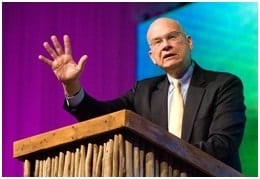
“If you love what God loves, you will go to the cities.” This is what Tim Keller told global church leaders at Cape Town 2010.
Our planet just reached the tipping point. For the first time, human kind is more urban than rural. According to recent reports by the UN, in 1800, only 3% of the world population was urbanized. In 2010, just over half of the world population lives in cities. But this trend is anticipated to continue so that by 2050, an expected 70% of the world will live in cities. And not just cities, but some of them will be what are called “mega cities.”
Mega cities are urban corridors where nearby cities merge. In American terms—think Newark and New York, or Chicago-Milwaukee, or Denver-Boulder, etc.. In the future these will be “endless cities.” And these are relatively small ones. Think larger. The biggest mega regions in the world today on the forefront of rapid urbanization are Hong Kong-Shenhzen-Guangzhou, China—home to about 120 million people; Nagoya-Osaka-Kyoto-Kobe, Japan—which is expected to grow to 60 million by 2015; and Rio de Janeiro-Sao Paulo—a region with 43 million people and climbing.
Why is this happening? More than any other time people are on the move. There is a global diaspora taking place and many are moving to cities. Some come pushed by the economics of poverty seeking employment opportunities. Some come as immigrants or refugees. Some come as students seeking a higher level of training or a more cosmopolitan world. Some come as professionals seeking to sharpen their skills or grab career opportunities. Cities are drivers of economic activity, and thus are magnets to people.
For all these reasons, cities are highly strategic places and Christians must reconsider them. Unfortunately, in recent times, Christians have had a bias against cities. Perhaps this bias came from being a predominately rural world. But that has now changed. And maybe this bias will change as well. Maybe it will even change in the church. It will if Keller has anything to say about it.
Tim Keller is the founding pastor of Redeemer Presbyterian Church in Manhattan. Redeemer has now been involved in the planting of more than 100 churches around the world. As he addressed the Lausanne Congress, he talked about the opportunity of the city.
According to Keller, cities are where churches can reach the next generation of young adults, who just happen to want to live there. Cities are where more unreachable people are—people who are actually more open to the gospel there than they are in their home towns. Cities are where you can reach “world changers” (i.e. authors, marketplace leaders, etc..) who want to have a big impact on their society. Cities are where you can reach the poor since about a third of city dwellers in the world live in shanty towns. And cities are also places where, said Keller, you have more people made in the image of God per square inch than anywhere else in the world.
Speaking from the book of Jonah, Keller urged the delegates to look at the cities of the world, and look at the masses of people in these cities. As in Jonah’s time, God says—why aren’t you moved by them? Why aren’t you going there? People are moving to cities faster than the church is. We must get over our Jonah-like reluctance and go to our Ninevahs.
Of course, going there is not easy. Ministry there has to be contextualized in order to be effective, said Keller, because cities are such gathering places of people from many cultures.
And those who pastor urban churches must show people there how their faith relates to their work, because in the city, jobs are a big part of an urban dweller’s life. And while evangelism is desperately needed in these cities, urban churches like Redeemer also emphasize mercy ministry, justice issues, the arts and cooperation with other Christians.
But if you want to go where the people are, and if you want to love what God loves, then according to Keller, we must reconsider the city and go there with the gospel of Christ.
